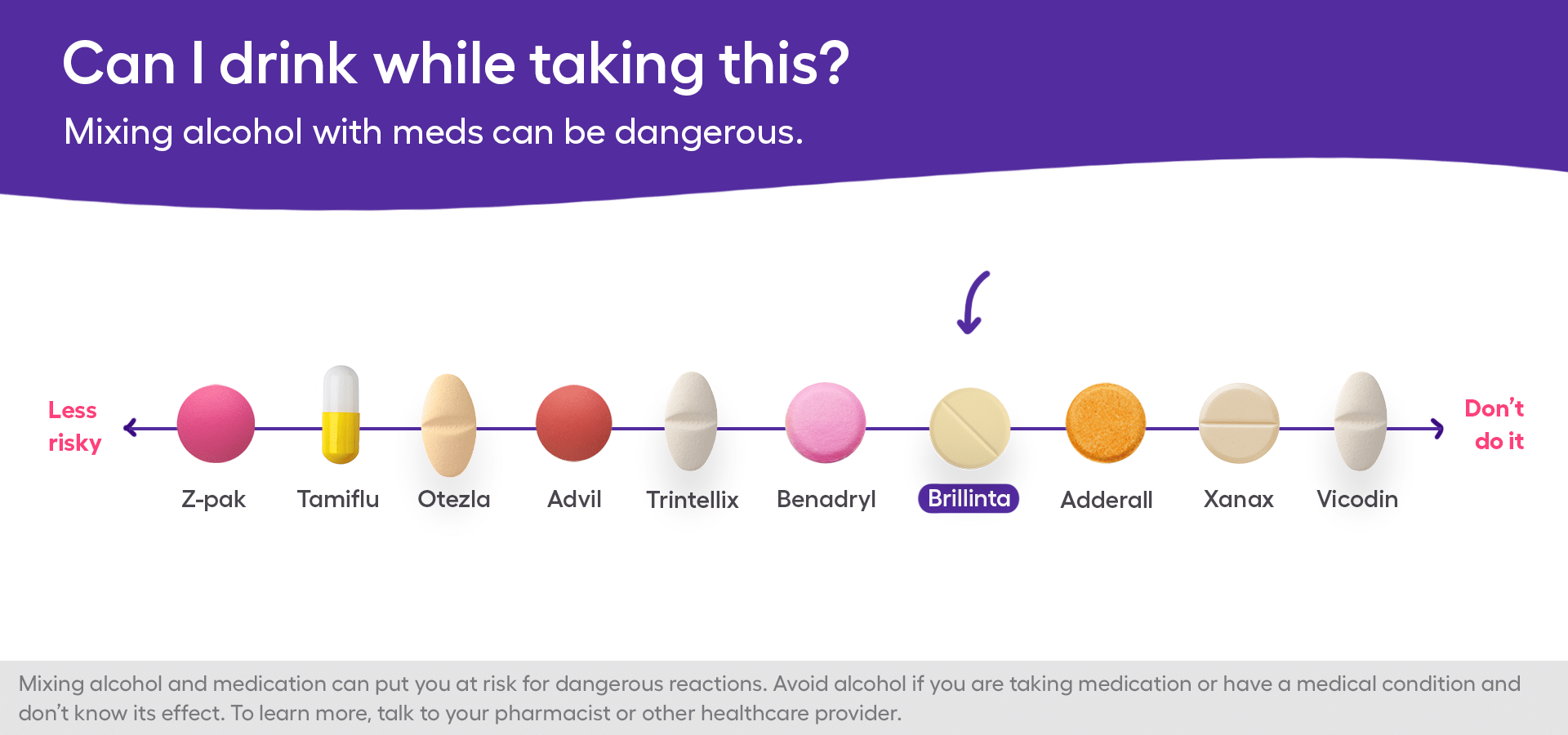Brilinta (ticagrelor) is a prescription antiplatelet medication typically used to prevent blood clots that can trigger major cardiovascular events. According to the FDA label, there is no explicit warning against the use of alcohol and Brilinta together. However, it is best to avoid combining Brilinta and alcohol, especially alcohol in excessive amounts. Here’s why.
RELATED: What is Brilinta? | Do Brilinta and caffeine mix?
What is Brilinta?
Brilinta is a P2Y12 platelet inhibitor approved to prevent a life-threatening stroke or heart attack in people with acute coronary syndrome (ACS). The medication works by blocking the P2Y12 receptor on platelets to prevent platelet activation. Without that activation, platelets in your blood are less sticky, so they don’t form clots as easily. It has similar effects to blood thinners (also known as anticoagulants), like Coumadin (warfarin).
Can you take Brilinta with alcohol?
As blood thinners, Brilinta and alcohol can decrease blood clots. Drinking alcohol in moderation is not likely to cause severe side effects during treatment with Brilinta. Moderate alcohol consumption is defined by the National Institute on Alcohol Abuse and Alcoholism (NIAAA) as two drinks or less per day for men and one drink or less per day for women.
The potential risks of combining Brilinta and alcohol are more apparent in cases of excessive alcohol consumption, chronic alcohol use, or alcohol abuse. Men who drink more than four drinks on any given day or more than 14 drinks per week may be at a high risk of bleeding while taking Brilinta. Women who drink more than three drinks on any given day or more than seven drinks per week may be at a high risk of bleeding while taking Brilinta.
Treatment with Brilinta includes a daily aspirin, which also works as a blood thinner to stop the production of blood clots. Therefore, there may be an increased risk of bleeding when combining Brilinta, aspirin, and alcohol.
According to the FDA, people who consume three or more drinks per day should use caution while taking aspirin. Heavy, chronic alcohol use can increase the risk of bleeding events.
RELATED: Brilinta side effects and how to avoid them
The risks of Brilinta and alcohol use
Alcohol may be beneficial when consumed in moderation because it has blood-thinning effects. Light-to-moderate intake of alcohol has been associated with a reduced risk of heart problems related to reduced blood flow. Alcohol use in moderation may help decrease the formation of blood clots and improve blood flow.
Heavy alcohol use, in contrast, may increase the risk of a stroke or heart attack. According to studies, regular binge drinking is associated with an increased risk of stroke. Long-term, excessive alcohol intake can also affect the liver and cause alcohol-related liver disease. Alcohol misuse over time can cause fat buildup (fatty liver disease) and extensive damage in the liver.
Brilinta is primarily processed in the liver and should not be used in people with severe liver disease. People with liver disease who take Brilinta may be at an increased risk of bleeding.
The side effects of alcohol and Brilinta can overlap. Both Brilinta and alcohol can cause dizziness, nausea, and stomach upset. Combining Brilinta and alcohol use may lead to an increased risk of experiencing these side effects.
Looking out for your health
Taking Brilinta and drinking alcohol is not an ideal combination. However, in most cases, light-to-moderate alcohol consumption is not likely to cause significant harm with Brilinta. Instead, it is strongly recommended to avoid excessive alcohol consumption while taking Brilinta.
Because Brilinta needs to be taken with a daily dose of aspirin, it’s best to use caution when considering alcohol use during treatment with both Brilinta and aspirin. The risk of bleeding may be increased when drinking alcohol and taking two blood thinners instead of one. If you have concerns about Brilinta and alcohol use, consult with your healthcare provider for more information.












